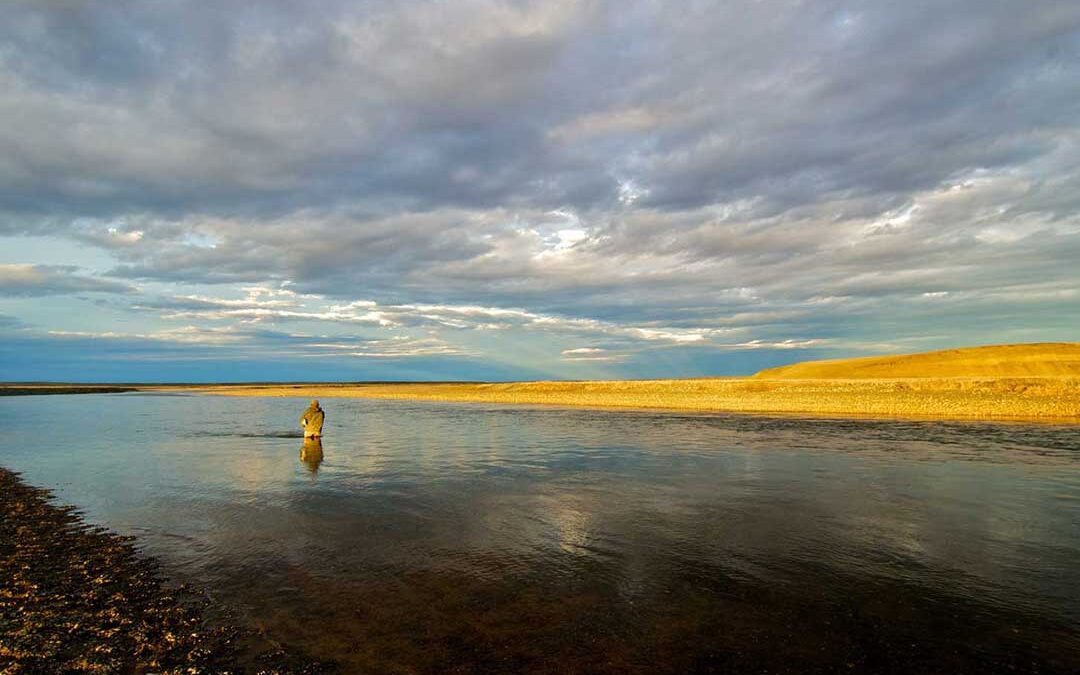I must tell you a story.
A story of old Argentina. A story older than two centuries, but as young as yesterday. A story within a story, for one would be untold without the other. A story of many things, though at its core the strength and soul of a woman. Not of Evita Peron, the one that you know, but of another of even greater courage and conviction. And when I have finished, you will wonder can this be so. Yet I will tell you it is real; I will assure you it is true.
For once, more than a century ago, there was a young man of ample wit and humble ambition named José Menendez, who would venture from the mother country to find his fortune. First to Cuba as his father before him and later to Buenos Aires, and afterward to Chile, before discovering heart and home in Patagonian Argentina. He would take a young Uruguayan wife, and he would become an important and influential man, and he would found a great estancia, one of the greatest in all of Argentina.
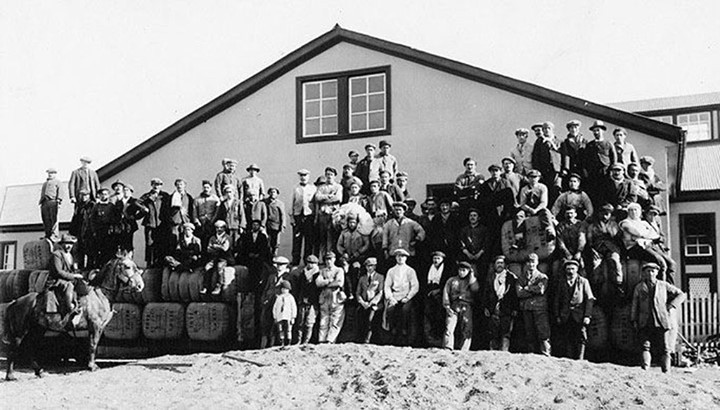
But then, the story I must tell is not only the one well-known, of José Menendez and the Segunda Argentina, but of his woman. For she would be his strength, more than he knew. It happened, you see, that in the early years when they for a time resided in Punta Arenas – in Spanish Chile – there was a prison station near that small city. And upon one terrible day a rebellion among its inmates, an escape, and criminals terrorized the town. The civilians fled in pandemonium to the forest, all but the wife of José, her husband away with business. She suffered the complications of their first child and could not. In the ensuing violence she was shot in the leg, gangrene took hold, and alone, with minimal care, she endured the pain and horror of the amputation.
That is what José Menendez returned to find, and too late he realized the harshness and peril of their domicile, and he said to her “I have loved this place until now, but now . . . now, we go back to Buenos Aires . . .”
I did not know this then, the morning of our arrival, as abruptly the clouds parted and below lay the small airport and the town of Rio Grande, by national law “the sportfishing capital of Argentina.” I knew only the reputation of the river of the same name that lay hard alongside. Its rendevous with the Atlantic was vivid from the air, and perhaps the exchange was less than I had imagined; for all the herald it might have been gilded with gold. The elocution of Tierra del Fuego and the Grande is as phonetically evocative among fly-fishers as Mozart and Don Giovanni among passionates of the opera. Pondering the stream provisionally – for here I was at last, the dream had made the distance – I accepted the romance of its promise with an impartial grain of wonder. The legend of the sea-run browns that make these waters home remained hard to suppose.
Tierra del Fuego, “Land of Fire”. . . ’end of the world,’ last great island on the American continent. Strange its name, for much of the archipelago of which it is part is cold, barren or snowbound. It was the wigwam fires of the Yagans that fooled the Spanish. Fifty-three degrees, forty minutes south, sixty-seven degrees, forty-one minutes west marks our position. Just north of the Roaring Forties, treacherous Cape Horn, “place of the freezing stories,” rich and fierce with shipwrecks, gold seekers, hunters and gatherers, criminals, saints and pirates. Stronghold of the Ona, Uhganis, the Alakalufes, some 9,000 years before Magellan arrived – before the strait – though the latter quarter of the twentieth century would find not a one of them left alive.

Eleven rods strong we landed, a loose aggregation of wishful souls, as yet unbonded by the intrigue and farternity of our quest. Dick Conroy, Jobe Monson and Stephen Podd from The States northeast, Californians Gordon Mann, Dave Threshie, Paul Cleary and Mike Hagan. Peter Montgomery and myself, the brothers Heasley of the UK. Six days on the Grande would elicit a comraderie to bind our association even more fundamentally than the nightly delight of the dinner palaver.
Couple the native warmth of the Argentine people . . . like a warm spring . . . bubbling and churning, gushing with fluid spurts of Spanish enthusiasm. Because now, as the day before in Buenos Aires, we are engulfed by radiant faces. Only this time they are our guides. Strangers, only briefly, who will become mentors and friends.
There is a big man among them, deeply bronze, mustachioed and bearded, with laughing eyes and a beaming smile, a man of assurance that attracts the attention of a Matterhorn. His name is Alberto Molina Gómez, and he manufactures English in a manner that renders him quite adequate, though wonderfully native and Argentinean. Unsurprisingly, he is Head Guide, and when I find I will be with him for the week, I am very glad.
Quickly talk rives to the river.
“The river is very low and clear,” Alberto observes. “It puts the fish, I think, in the pools.” It is a point of celebration, such a stage of the river, and there is its echo among his companions. Infectious, the mood is festive as a piñata.
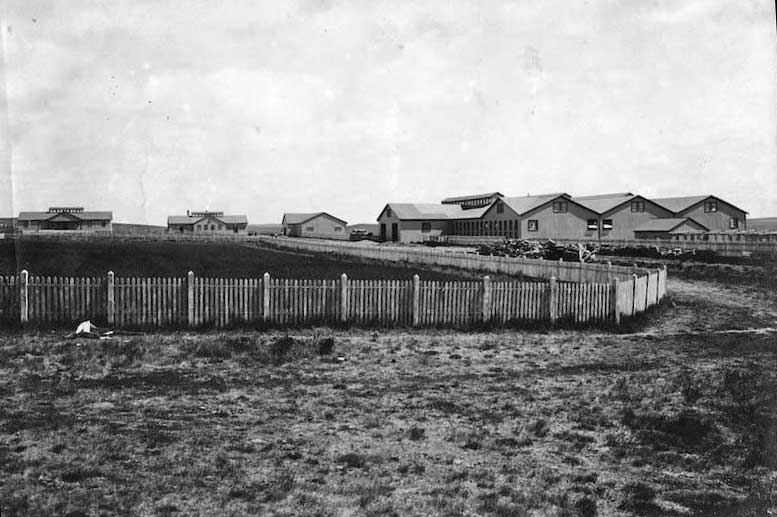
We’re standing on it already, the vast Estancia of Menendez. The very deed trust for the town was granted through the generosity of the family. From here, to the heart of the ranch and the lodge, we will travel many miles and all will be Menendez. Working here still – visible in anachronistic sketches across the pampa – the Gouaches and their Criolla horses, teams of herding dogs. Forty-thousand sheep run the range, two-thousand head of Hereford cattle. Here rears the largest shearing shed in the world; the most prestigious barn of Corriedale rams in the western sphere. Prolana wool, mutton and lamb, prime Argentine beef: the favors of its production.
Founded in 1897, the holding originally covered a vast majority of the island, Chilean and Argentinean. Today, the estate remains immense, it’s most important measure the first inland thirty-five miles of the Rio Grande – roughly seventy-seven percent of the Argentina flow – for which it forms the northern bank. The best sea-trout beats of the river are acknowledged to lie in this expanse, one-hundred-two pools, shared by rotation with its south-shore, sister lodge, The Estancia Despedida.
Though southern Patagonia can be infamously harsh – cold, wet, blustery and dreary – today the wind is lazy, the sun spills down from an immense blue sky, and if you think Montana is vast, it is but a pane in the window of a hemisphere compared to the astonishing ceiling of the del Fuego universe. The pale-green, short-grass pampa sprawls away, more distantly than you can see, deprived of trees but wrinkling into one gentle hill before another, to the imprecise boundary of the horizon, the ash-gray make of the mountains. At the epi-center of the rugged tableau wends the river . . . between purple-gray shoulders, a nomadic wander of cerulean blue. The shiver at your neck is not the chill, but a thought of the thrills that await in its pools.
La Yerra, the Gouacho ritual of branding and castrating the steers, is asway at the main corral. Yik-ki-yi. A rodeo of bloodied, wind-burned men in broad-brimmed hats, chaps and high boots hanging deperately onto a pen-full of bucking, bawling, wall-eyed young bulls, drug amidst the boil of dust across the paddock in their attempts to throw the fear-crazed bovines for the iron. Wild and happy, the melee, tempting the challenge, but we do not linger. For there awaits the asado, traditional Argentine barbecue.
Alejandro, of the Family Menendez, great-grandson of José and manager of the Lodge, provides the welcome. The dining pavilion is gaily lit by the colors of Argentina . . . sunshine yellows, sky blues, pampa greens, earth reds; symbols of wings and horns, men and mountains. Homily and laughter pour as fluently as the first of the Argentina wines, a malbec red by Avena, a chardonnay-semillon by Rafael, from the fabled vineyards of Mendoza. Between the open fires and their skins roast great racks of beef and lamb. The camareras, with heaping platters, make their rounds of the tables.
“Will you have the little more, Senõr?”
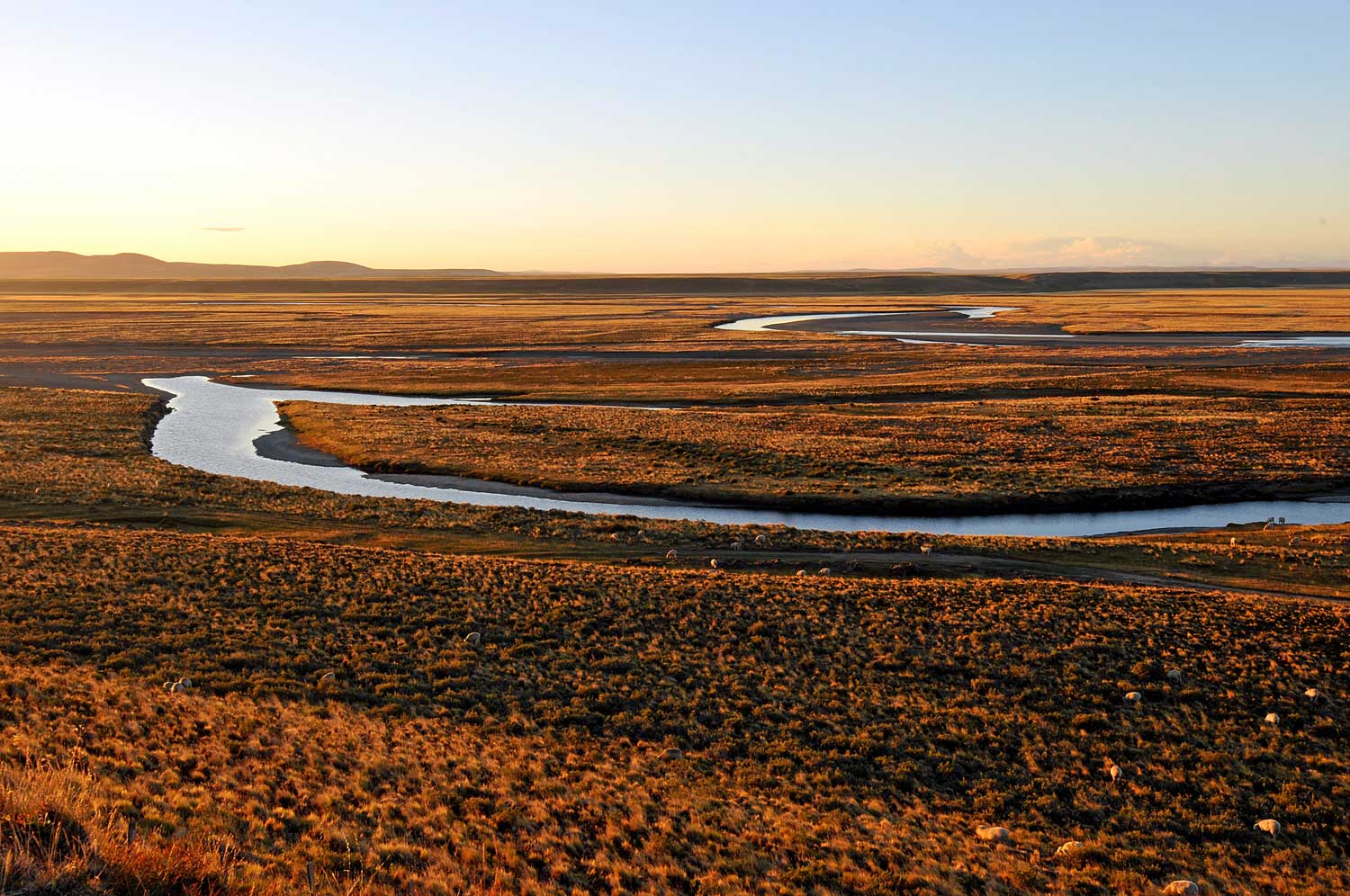
So it is that mid-afternoon we reach the Lodge. It sits upon a high knoll, like the eagle, watching the travel of the river below: the river near the middle of the journey from its birth to the sea. Today, time does not matter, not until tomorrow do we fish. Today is for siesta, today is for considering the water, today is yet for dreaming. Today, when we awake, the reverie will be real.
Deceptively plain on the exterior, the lodge beckons past its threshold to an open-air symphony of color and geometry. The construction is timber-frame, completed by a fully-glassed foyer that looks to the river. The red-orange cross-timbers of the roof frame and sky-walk partner agreeably with the straw-tan of the hardwood floors, the mahogany of the bar, the gay colors of the personality alcove, the stones in the chimney and the yellow-red blaze of the fire. Within a spacious rotunda under the rafters, before the languorous undertones of a Spanish guitar, all is arranged to an opus of South American timbre and sensuality. Like spokes of a wheel, the guest rooms radiate from its hub into alcoves of twin suites, each with a vestibule devoted to a fully complemented fly-tying and tackle bench. You know you are home.
Rearward, beyond the Fly Shop, the wet room . . . is a place even more inviting, the door that will open to the guide rendezvous for tomorrow’s fishing adventure.
Dinner is served. It seems we are eating again. Over the course of our stay, never will we have known an ambiance where food was so prevalent. Chef Fernando Sparti will render each meal a benchmark on a ladder of gourmandic delight, executed with originality and venture, and we are pampered to the point of torpor. Only the flush of the wines and the promise of the fish rescue us from indolence.
We pose the question of the fish, the great sea-trout, not the first time, of course, but Alejandro is patient with the answer.
“It is John Goodall, a Britisher, no,” he explains, “manager of the meat plant we had in the Town of Rio Grande . . . who thinks of seeding the trout into the rivers. I don’t know – in the thirties, like thirty-two to thirty-six when he suggest to my family we bring the small fishes to the farm. And he puts them in the river. When he does all the work and the studies.
“Soon they go to sea, the little fishes and then they come back, and now they come back and they are the grandest in the world, no?” He laughs heartily.
To bed then, with the question in our heads, and six o’clock on the morrow cannot arrive soon enough, for then we shall know.
One hundred-two pools, I muse before briefly I sleep . . . Ali Baba, La Roca, Barranca, Pileta . . . all with a history of hopes that grew into somebody’s dreams.
“Show me the fly box,” Alberto said.
And so we began, with a #6 Tarantula, and past the shadows and bridal mist over the river, the dawning eye of the sun burns fiercely yellow above the low green hills.
“The fish are shy,” Alberto has cautioned, “you must not approach too close.” He will tell me again, and again, until I learn.
“The biggest fish of the pool will be here,” he has said. “I need you to place the fly exactly there” – he shows me, the line unfurling from the long, two-handed Spey in a great, perfectly orchestrated roll cast that delivers the fly as delicately as a morning kiss exactly ’where’ upon the cheek of the river – “now I need you mend . . . once maybe, and wait . . . to catch the mesh of the current, si, and then slowly you jiga . . . jiga . . . jiga . . .
“The pool is deep, the line, she must go there.”
Now he stands by, watching to see that I do somewhat closely, and I feel as the sinner before Saint Peter. But I lay my first line over the Grande. A first engagement with the Patagonian wind, and it is tough – tough – but gradually I am winning. When all is right I know, I feel it, through the message of the line and the pulse of the river.
Five minutes later the line loads, the rod leadens as I set into my first maritime brown. Seconds afterward he erupts skybourne, saluting the sun. ZZZurrrr . . . he bleeds the reel. He is a small one, only about eleven pounds, but oh, so strong, and so lovely against the sparkle of the water and the happiness of the morning.
I look to Alejandro, and he has a fish on as well. I admire him as I struggle a bit, and he catches two more in the mere twenty minutes before the pool shuts down. The fish hush. All is quiet.
Ah, but elsewhere, before lunch and siesta, Paul Cleary has landed a thirteen-pounder, an awfully good brown trout most elsewhere about the planet.
It is the afternoon, as I am getting better, when glory begins to exude from the Grande. We had moved, clamored into Alberto’s Defender and dashed for another beat. Because my compadre had sensed in the first five minutes “the pool, she is dead. We must go. I think I know the place.”
But no, we fished there for a time, until Alberto’s instincts were restless again, and near dusk we hurried back to the pool we had originally deserted.
The wind had actually quieted, the air mild and contented. On the western horizon, in the bellies of the tattered clouds, the remnants of the sun smoldered in a blaze of molten yellow, hot pink, blood-orange and mauve. Iris blue and clean, the sky above. While to the east, the river caught the glow, building rosehips upon the pewter shimmer of the water. Even as the egg-shell crescent of the ascending moon commanded the evening.
In the dusk-dark netherlight of its magic, the magnificence of the Grande erupted like fireworks on Independence Avenue. A ten, a twelve, a fifteen-pounder, on a tandem of a Green Machine and Beaded Prince, and then as the pampa lapsed charcoal-green, and the peaks of the Andes were lost to the night, purple and black, there was the take of the seventeen, and he soared and somersaulted – it seemed most of four feet into the sky – and he had his way with me for a time, until finally we slid him into the shallows and, fresh from the sea, he lay heaving, silver as M’Lady’s necklace under the satin glow of the moon.
But it does not stop. In the Barranca pelada, upon the afternoon, the ante climbs still. Though Fate teases us a time.
The wind, forgetting itself this morning, is now ferocious. But that is the risk of the wager, for the splendor of the fish. Would you throw away a pudding at a single fly?
“I no like the wind,” Alberto exclaims, however, “I think we take a slow ride. Then we wait. While I consider the pool.”
A cara-cara was there before us, fishing idly too. Alberto thought once he saw a condor, but it turned into an eagle.
“Now we fish,” Alberto finally says.
Oh, do we. Five fish I have landed, another fifteen, another sixteen, another seventeen . . . pounds, that is, not inches . . . before night drops the curtain from the hills. The next morning proceeds as dramatically, so joyfully that I am losing track of the fish. That I both catch and lose. The action is so solid.
But I do not forget the one – he takes delicately, but his strength is herculean. We never see him. He leads me up and down the bank, plays with me. Into the backing. Surging, surging, deep he stays; I feel his electricity throbbing through the big rod. Then finally, he is through with me and pulls free. The truly big ones are hard to claim. They stress you and your tackle until, most often, something gives. Alberto and I agree; he was huge.
Desire is whetted to a fever pitch. As on we edge toward the great one.
All the while Alberto is teaching. There is always the one best place in a pool.
“How long did it take you to learn this river, Alberto?”
“Sixteen years,” he shrugs, “and I think maybe sixteen more.
“The river, she is like a senorita to whom you present your affections. Over the time she will grant you a favor, but never her familiarity.
“She changes, week-to-week, year-to-year. A man becomes a fool . . . you must use all you know of her. Sometimes then, even, is not enough. There will be sometimes fish here, sometimes fish there. The families do not return every year to their pools. The river may be high or low. Sometime we have twelve rods on the same pool, when the river, she is high and angry.
“For that is only where the fish are. But we catch them.”
He studies himself for a moment.
“You must always be thinking . . .
“You see how many times we change flies. This river is different, requires many techniques.”
Senõr Gomez should know. He has several fish over twenty-eight, a monster of better than thirty-four. Nearing the river record of thirty-five and so. The one he remembers best: a twenty-eight, on a skated dry. “It was a great fish,” he says, “and a beautiful technique.”
I was listening. This river had many subtleties. That is her mystery and that is her story.
On the third afternoon she presented her favor to me.
It was not one of Alberto’s favorite pools. It was very deep, very hard to fish. There is only the one very small spot.
“Put it here,” Alberto said, “mend . . . mend . . . wait . . . sink, sink . . . then jiga . . . jiga . . . , very slow, then, now, s-t-ri-p, s-t-ri-p . . .”
It was, I believe, the second strip, but oh, the take was so, so delicate. I set as my life depended on it, sideways, with the strength of both shoulders. And the river set back. The rod loaded to the butt, and the line sizzled, air and water, as the heavy fish bored away into the current. Zzzzzzuuuhhrrr . . . zzzzuuuuhhrrrr . . . zzzzzuuuuhrrrrrr . . . the reel winced at its furor. Nothing to do but hang on and pray. Turning now – the fish – scorching toward me, while I reeled fitfully . . . find the fish, find the fish . . . backing, tripping, trying to catch up – and just as I manage – off again – the spool hot against my palm. Zzzzzuuuhrrr. Deep, deep, sulking. My nerves are drawn tighter than the line . . . sweat beads on my brow.
Minutes drain by, three of us locked into the see-saw of the battle. Finally, the great fish is tiring, at last we see it, and Alberto says, “It is huge, a huge fish. Be very slow, be very careful.”
When at last it flounders in the net, at the shallows by the shore, the relief implodes in a incomparable spasm of triumph, and jubilation is as the song of victory that you sing when you have topped a mountain. Because our fish is like the name of the pool – La Gringa – beautiful woman . . . a huge hen of twenty-seven-and-a-half pounds. That has returned to the river long enough to regain the grandeur of her native colors. She is magnifico.
I did not fish anymore that afternoon. It was a glorious del Fuego day, and in the heat of our conquest, perhaps I had not appreciated it so fully as I did then. The lay of the river valley, the flocks of white ibis against the cobalt waters at its breast, the restless lift and flight of the geese against the great landscape, the tawny guanacos on the sides of the pale green hills, the scatter of the sheep and spackle of the white gulls on the blue gravel bars. The tableau of the snow-capped Andes – Flattop Mountain – beneath which lies El Blanco, mother-waters of the Grande.
There is a plain and special beauty here, like Sarah On the Prairie.
For three more days, the pagent was regenerated through the voice of the wind, the song of the river and the fish from the sea. One-by-one, each of us would realize what we had come for, and each day at evening’s end, after the adventure of the dinner and the warmth of the wine . . . know the glow of completion . . . know that life was as you would have it, that at last, fortune had tripped upon your doorstep.
Dick Conroy, with a fish that would easily break his long-standing home-state record. Britisher Peter Montgomery, besting convincingly his homeland’s grandest sea-trout ever. “Nineteen pounds something,” he mused, in his best accent, “way back about nineteen hundred. Yet, here, they’re virtually common.” Between us, seven brown trout better than twenty pounds.
The happiest times of your life are always shortest. The days spun by into a week as swiftly as hindsight washes weeks into years, until we were brought against the irony of any, really great trip – the joyful sadness of the parting.
Gosh A’Mighty, it was Grande.
The stream of life is like the river . . . divided by many islands . . . and one must decide, right or left, upon which of the forks destiny shall invoke its decree. So it was that the young wife of José Menendez, heavy with a first child and suffering the loss of a limb, replied to him, “No, my husband . . . we are from here, it is here that we belong, and it is here we will stay.”
So that it is important for you to know, had it not been for her courage, her love for the land so long ago – when it could easily have gone differently – we could not have been there. There would have been no great estancia of Segunda Argentina, which José would afterward, and ever, re-christen with the name of his wife, and they would not be buried there together for eternity, beside a lovely La Villa, nor would there have come to be a John Goodall in that place or time, nor would there be the fabled fishing lodge which today honors her name.
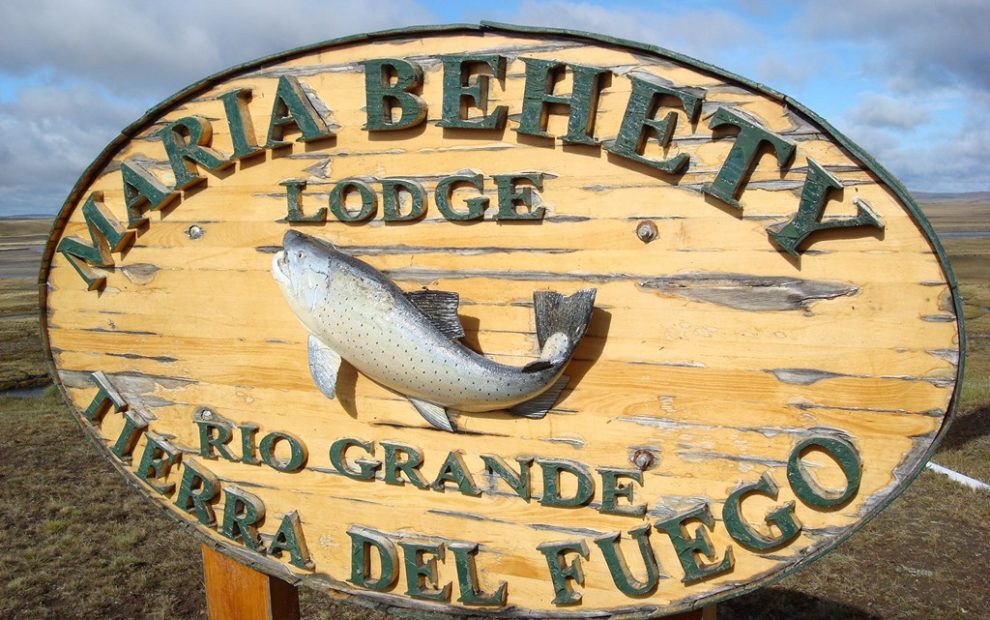
The Lodge of Maria Behety.
Nor the legend of the Grande – greatest sea-trout river in all the world.
Note: River of Many Returns is one of 67 chapters in Mike Gaddis’s Turning for Home

